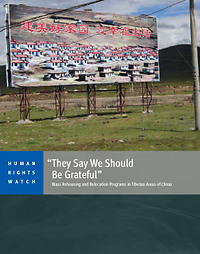
Cover picture of the Human Rights Watch report “They Say We Should Be Grateful”
Photo: Human Rights Watch
A new Human Rights Watch (HRW) report has condemned the continued Chinese state policy of mass rehousing and relocation in Tibet. The report builds upon previous reports and increased global attentions on the Chinese government’s actions, criticising the plan to “build a new socialist countryside” in Tibet, which so far has caused the resettlement of more than two million Tibetans.
The 115 page report highlights instances where residents have been coerced into relocating with inadequate consultation, as well as some of the many issues with the housing and the unsustainable nature of the relocations.
Whilst Chinese authorities have always argued that all relocation is performed in accordance with “the will of the Tibetan farmers and herders”, the report draws heavily on interviews conducted with nomadic and farming Tibetans and suggest that a significant majority were either never consulted. or were not offered any viable alternatives.
The document also reports convictions handed out as a result of protests against relocation, saying “relocation and rehousing policies were presented as ‘law’…[and] this made it seem that opposing resettlement was akin to breaking the law”. An example was given from July 2012 when Pulten Tsang and Gyurko Tsamtsang, two men from a nomadic community in Sichuan province, were given four and three years imprisonment respectively after been convicted of staging a protest against relocation.
The Tibetan Centre for Human Rights and Democracy (TCHRD) points to this inability to protest as being one of the greatest obstacles facing Tibetans, citing the recent example where locals have been forced to move to make way for a hydroelectric project in Muge in Eastern Tibet: “Local Tibetans are facing enormous challenges in freely expressing their grievances…addressing these legitimate grievances peacefully should be the priority to ensure true harmony and stability in Tibet”.
Whilst it is true that some Tibetans have said that they willingly chose to move, the HRW report questions these admissions. One of the several candid interviewees stated that “no one here would think of complaining to the authorities… Since I am uneducated I have to listen to whatever orders officials give, that’s the sad truth”. Underneath all of these claims by the Chinese government of free choice or economic progress in Tibet, it is clear that there is the view amongst authorities that “all the land belongs to the state”. Faced with no real alternative options when offered to resettle, and in the face of an intimidating and assured government philosophy, the overwhelming voice of thousands of Tibetan rural and nomadic communities is one of fear and helplessness.
The problems highlighted by Human Rights Watch do not end when the Tibetans are relocated. Having been moved into housing projects, many Tibetan families are forced into “Comfortable Housing Loans”, often tens of thousands of yuan. This policy of self-funded construction runs the risk of forcing families into debt, as the average yearly income is around four thousand yen. The houses themselves have often proved unsuitable and unsafe, with some of the Government’s own sources pointing to serious problems, going so far as to state that “in some cases the location for new constructions was chosen unscientifically”, leaving residents at risk of landslides, flooding or total building collapse.
The Chinese social engineering project in rural Tibet is nothing new for China. Robert Barnett, director of Modern Tibetan Studies at Columbia University states that “the cultural cost of disrupting this nomadic life is hard to measure but the price is high”. Previously it has been all too easy for the Chinese government to argue in favour of relocating Tibetans, but this new report goes some way to address this. The problem is attempting to measure cultural loss verses easily measurable financial and general economic gain.
The communities most affected by these policies feel helpless, largely because they are without voice. In centring this report around those affected, HRW has given them a platform upon which to voice their grievances in the hope that, this time, the world will stand up and take notice.




 Print
Print Email
Email